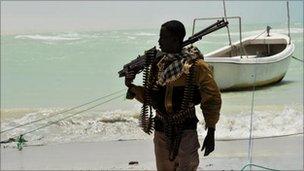Q&A: Somali piracy
- Published

Somali pirates are now operating farther offshore
Pirates have been operating in the Gulf of Aden, one of the world's busiest shipping lanes, for several years, prompting world powers to send their navies to safeguard international trade.
How do the pirates seize the ships?
The pirates are very good at what they do. They run sophisticated operations using the latest hi-tech equipment such as satellite phones and GPS.
They are also heavily armed with rocket-propelled grenades and AK-47s. The pirates are known to receive tip-offs from contacts at ports in the Gulf of Aden.
They use speedboats with very powerful outboard motors to approach their target. Sometimes the speedboats are launched from much larger "mother ships" on the high seas and they have even managed to seize enormous oil tankers.
With warships patrolling along the Somali coast, the pirates have started to operate further away and have even staged some attacks across the Indian Ocean, closer to India than Somalia.
To actually hijack the ships, the pirates first use grappling hooks and irons - some of which are even rocket-propelled - and climb aboard using ropes and ladders. The pirates have also on occasion fired at the ships to scare them into stopping, so it is easier for them to board the vessel.
The pirates then sail the hijacked ship to their base, often the town of Eyl. There, pirates usually take the hostages ashore where they are normally well looked after until a ransom is paid.
Why can't the pirates be stopped?
The International Maritime Bureau (IMB) is advising ship owners to adopt measures such as having lookouts or travelling at speeds which would allow them to outrun the pirates.
However, the pirates move extremely quickly and often at night and so it is sometimes too late before the crew has realised what has happened.
Once the pirates have taken control of a ship, military intervention is complicated because of the hostages on board.
There is also no international legal system for people accused of piracy. Although some have been put on trial in Kenya, the government says it is unfair if all the pirate suspects are sent there.
One group has been jailed in the Netherlands - in Europe's first such case - while another group has been sentenced to death in Yemen. A trial in the US in 2010, meanwhile, convicted five men of piracy for an attack on a US Navy ship.
But pirates apprehended on the high seas are also frequently released because of the difficulties of prosecuting them.
Some argue an international court is needed, backed by the UN, with perhaps even an international prison for those convicted.
The UN Security Council has approved a resolution allowing countries to pursue Somali pirates on land as well as at sea - an extension of the powers countries already have to enter Somali waters to chase pirates.
But as long as Somalia continues to exist without an effective government, many believe lawlessness within the country and off its lengthy coast will only grow.
How big is the problem?
The IMB estimates that 53 ships were hijacked worldwide in 2010 - 49 of them off Somalia's coast - and says a record 1,181 hostages were taken.
The problem also appears to be growing. Overall, there were 445 pirate attacks in 2010, a 10% rise from 2009, the IMB says.
Meanwhile, maritime piracy costs the global economy between $7bn (拢4.4bn) and $12bn (拢7.6bn) a year, according to a separate study by a US think tank.
The problem is a massive headache for shipping companies, who pass on the extra costs - security, higher insurance premiums, ransoms and extra fuel for longer routes - resulting from the pirate threat to consumers.
The head of the European Union naval force tackling the pirates, Navfor, says he is worried that the pirates have been able to hugely expand their field of operations.
However, he also thinks the presence of the warships has made a difference.
Last year, Navfor said the pirates' success ratio - the number of successful hijackings versus the number attempted - had dropped from 50% a few years ago to 20-30%.
Why do the pirates do it?
For the money. The pirates treat the ship, its cargo and its crew as hostages and hold them for ransom.
The rewards they receive are rich in a country where there are no jobs and almost half the population needs food aid after two decades of non-stop conflict.
The Kenyan foreign minister estimates pirates received $150m in ransom payments in 2009.
They use some of this money to fund future operations - more powerful weapons, bigger, faster boats and more sophisticated equipment.
Some of the pirates are former fishermen, who say they have been put out of business by trawlers from around the world taking advantage of the lack of government in Somalia to scoop up all the fish in its territorial waters.